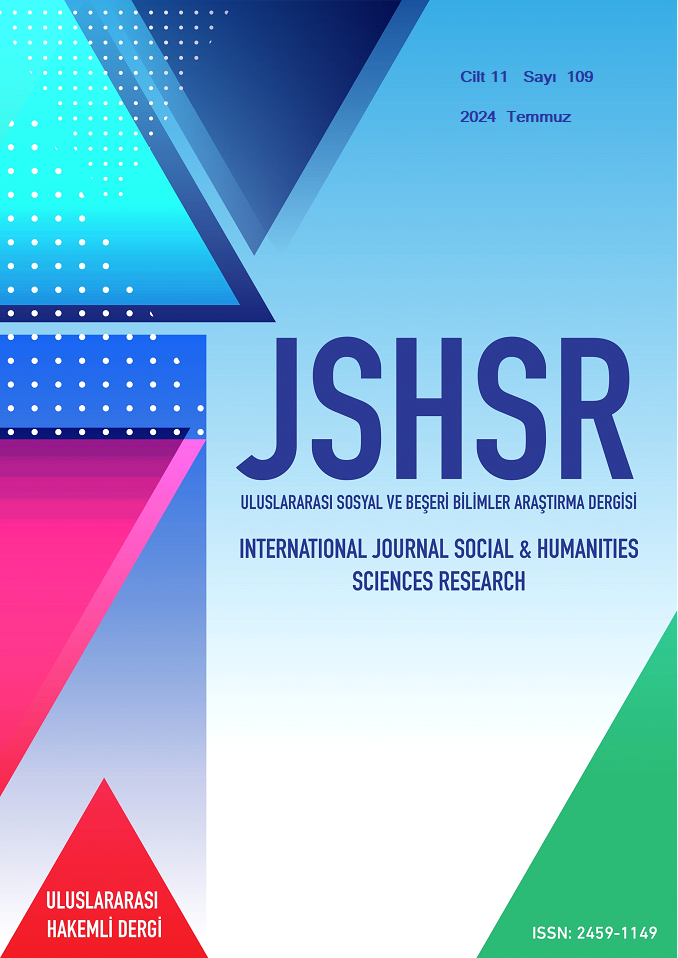What has been Done about Adaptive Learning in Social Studies and History Teaching?
DOI:
https://doi.org/10.5281/zenodo.13147077Keywords:
digital content, artificial intelligenceAbstract
The computer-based education approach that provides learning environments suitable for the individual characteristics of the learner is today called adaptive learning. This study aims to examine the articles written within the scope of adaptive learning in Social Studies and History teaching in Turkey between 2020-2024. Document review, one of the qualitative research methods, was used in the research. The study was conducted with 60 articles selected with the criterion sampling technique. Data was collected through the "Article Review Form" developed by the researcher and analyzed using the descriptive analysis method. According to the results of the research, in the field of social studies and history teaching; Articles that can be examined within the scope of adaptive learning were found in the categories of augmented reality, online applications, digital content, micro teaching, games, virtual reality, distance education and artificial intelligence. The purposes of the articles were examined in 4 categories: "obtaining opinions, making applications, developing materials and providing information" and it was seen that the majority of them were made for the purpose of obtaining opinions. It was concluded that the majority of the articles were published in 2022, had a qualitative research approach and were conducted with a student sample. In the context of the study results, it was noticed that there were no studies that fully included the concept of adaptive learning in the field of social studies and history teaching. It is recommended to encourage researchers who will work in this direction.
References
Afacan, Ş. (2022). COVID-19 pandemi sürecinde uzaktan eğitim ile gerçekleştirilen keman eğitimi derslerine ilişkin öğrenci görüşleri. Nevşehir Hacı Bektaş Veli Üniversitesi SBE Dergisi, 12(1), 472-487.
Avcı-Akçalı, A. & Baş, Ö. (2020). Sosyal bilgiler eğitiminde teknoloji kullanımı konusundaki araştırmalar. The Journal of Academic Social Science Studies, 81, Autumn: 15-30.
Baykan Z. (2021). Adaptif öğrenme (Uyarlanabilir öğrenme). Ö. Mıdık (Editör), Tıp eğitiminde yeni nesil konular içinde (s.6-12), Ankara: Türkiye Klinikleri.
Creswell, J. W. (2008). Qualitative, quantitative, and mixed methods approaches. Sage Publications: Usa.
Fraenkel, W., Wallen, N. E. & Hyun, H. (2012). How to design and evaluate research in education, New York: Mcgraw-Hill.
Gökçearslan, B., Ünal, A. İ. & Değirmenci, N (2023). Sosyal bilgiler eğitiminde teknolojik kullanıma yönelik lisansüstü tezlerin analizi. Necmettin Erbakan Üniversitesi Ereğli Eğitim Fakültesi Dergisi, 5(1), 14-28.
Gültekin, M. & Durmuş, B. (2019). Türkiye’de uyarlanabı̇lı̇r öğrenme yaklaşımı kapsamında yapılan tezler üzerine bir içerik analizi̇. Eğitim Teknolojisi Kuram ve Uygulama, 9(2):438–62.
Güneş, G., Ayantaş, T., Güneş, C., Güleryüz, O., & Arıkan, A. (2021). Sosyal bilgiler eğitiminde teknoloji kullanımına yönelik yapılan araştırmaların incelenmesi. Türkiye Sosyal Araştırmalar Dergisi, 25(3), 859-890.
Karataş, İ. H. (2024). Türkiye yüzyılı maarif modeli hakkında. Alanyazın, 5(1), 6-11.
Li, F., He, Y., & Xue, Q. (2021). Progress, challenges and countermeasures of adaptive learning. Educational Technology & Society, 24(3), 238-255.
MEB, (2018). 2023 Eğitim Vizyonu. Milli Eğitim Bakanlığı.
MEB (2024a). Öğretmenlerin gözüyle teknoloji ve eğitim bölgesel çalıştayı raporu. Milli Eğitim Bakanlığı.
MEB (2024b). Türkiye yüzyılı maarif modeli. Milli Eğitim Bakanlığı.
Merriam, S. B., & Tisdell, E. J. (2015). Qualitative research: A guide to design and implementation. John Wiley & Sons.
Miles, M. B., & Huberman A. M. (1994). Qualitative data analysis: An expanded sourcebook. (2nd Edition). California: Sage Publications.
Muñoz, J. L. R., Ojeda, F. M., Jurado, D. L. A., Peña, P. F. P., Carranza, C. P. M., Berríos, H. Q. & Vasquez-Pauca, M. J. (2022). Systematic review of adaptive learning technology for learning in higher education. Eurasian Journal of Educational Research, 98(98), 221-233.
Mutlu, N., Bayram, B. & Taçyıldız, Y. (2020). Sosyal bilgiler öğretiminde öğretim teknolojisi kullanımı ile ilgili tezlerin incelenmesi. Academic Social Studies, 4 (Özel Sayı 1): 29-38.
Piao, Z. H. (2012). On education reform: A study of south korea’s smart education strategy. Education Science, 28(4), 87-91.
Riding, R., & Rayner, S. (1998). Cognitive styles and learning strategies. London: David Fulton Publishers.
Skinner, B. (1958). Teaching machines. Science, 128, 969-977.
Somyürek, S. (2009). Uyarlanabilir öğrenme ortamları: Eğitsel hiper ortam tasarımında yeni bir paradigma. Bilişim Teknolojileri Dergisi, 2(1), 29-38.
Şahin, M., & Kışla, T. (2013). Kişiselleştirilebilir öğrenme ortamları: Literatür incelemesi. Journal of Research in Education and Teaching, 2(1), 81-91.
Taş, M., & Düz, İ. (2016). Sosyal bilgiler öğretiminde teknoloji entegrasyonu. Eğitim ve Öğretim Araştırmaları Dergisi, 1(20), 180-188.
Ülçay, O. (2024). Türkiye yüzyılı maarif modeli değerlendirmesi. Ulusal Eğitim Toplum ve Dünya Dergisi, 1(2), 70-75.
Şimşek, H., & Yıldırım, A. (2011). Sosyal bilimlerde nitel araştırma yöntemleri. Ankara: Seçkin Yayıncılık.
Wu, H., Kort, E.D. & Bra P.D.(2001).Design issues for general purpose adaptive hypermedia systems. 12th Acm Conference on Hypertext and Hypermedia, Arhus, Denmark.
Yavuz, B., & Toprakçı, E. (2021). Covid-19 pandemisi sebebiyle okulların uzaktan öğretim yapması ile ilgili internet forumlarında paylaşılan görüşler. Karaelmas Eğitim Bilimleri Dergisi, 9(1), 120-139.
Downloads
Published
How to Cite
Issue
Section
License
Copyright (c) 2024 INTERNATIONAL JOURNAL OF SOCIAL HUMANITIES SCIENCES RESEARCH

This work is licensed under a Creative Commons Attribution 4.0 International License.


